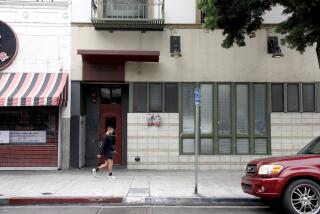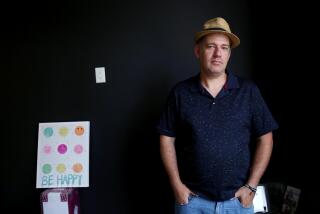The King of Skid Row
- Share via
No one spends 25 years on skid row. Booze or drugs or a knife in the back kill them long before that, or they simply disappear like dirty water down a storm drain. Some who leave make it, some don’t. The ledger of the Don’ts is fatter than the Bible. The book of the Do’s is a pamphlet.
Then there’s Clancy Imislund. He’s observing a quarter of a century this month in the forlorn cluster of humanity that exists in L.A. as a City of Despair. A tough, caring ex-drunk, Clancy is king of that city, tending to those whose basic needs spin down to food and a place to sleep.
He’s managing director of the Midnight Mission, a solid, no-nonsense haven that’s as much a part of the row as a drunk in a doorway. Founded in 1922 by a welfare worker known as Brother Tom, the mission has served as a kind of entryway to a new world for those willing to step across its threshold.
Clancy is one of them.
He was once a successful advertising executive, but booze cost him his family, his career and damned near his life until he gave up the bottle 40 years ago.
Fed up with his drinking, his wife had taken their four children and left him to wander the country in a drunken haze. In 1958, he woke up in an alley on skid row, took a hard look at himself and decided that wasn’t what he wanted. An alcoholics rehabilitation center was his next stop.
Only then did his world begin to change.
*
I met Clancy in the 1970s, interviewing for a story on the killer we were calling the Skid Row Slasher, who was going around cutting throats on the south side of downtown. We ended up talking about victims of a different kind.
Clancy understood, as few men do, the nature of despair, the dissolution of pride and the abandonment of hope. He understood fear and violence and hunger because he had experienced them all.
I heard him once explain skid row to a young, well-intentioned dreamer who thought God and free doughnuts were the ultimate answers to need. Clancy got the look in his eyes of an eagle circling a hare and began in the kind of tone that doesn’t tempt debate: “Let me tell you about skid row, Peter . . .”
He drew a word picture of human calamity that had the kid stunned and fascinated at the same time. Then he said, “Every day I see deaths on the row, but you know the one kind of death I never see?” The kid shook his head. “Suicide,” Clancy said. “Suicides are caused by emotional conflict. There is no emotional conflict here, Peter. The people have just given up.”
No one knows the row like Clancy. But even as he perceives its misery he also understands the redemptive qualities of his Midnight Mission. Last year, in addition to serving 654,730 meals and providing 50,335 nights of lodging, the mission also came up with 868 jobs.
“Work,” they used to say in the blue-collar bars, “is the curse of the drinking class.” Clancy believes it’s the hope of the drinking class.
*
“If the people here don’t learn to work, they don’t learn to live,” he said as we drove around the row in his 21-year-old silver Cadillac. His hair is thinner and his face craggier than when we first met, but the strength in his voice and manner remain.
He’s proud of the fact that there’s a state employment office in the mission--the only such office not located in an official building. He quotes the old saw, “If I give a hungry man a fish I can ease his hunger for a day. But if I teach him to fish, I can ease his hunger for the rest of his life.” He believes that.
Skid row has changed during Clancy’s 25 years. Many of the old bars and pawnshops have given way to brightly painted toy factories and small businesses, looking a little like balloons in a graveyard. Families have moved in, adding a tone of stability to the City of Despair.
“You don’t see as many old drunks as you used to,” he said, driving down 5th Street near San Pedro. “Now they’re mostly young crack addicts. They’re harder to straighten out, but we keep trying.”
Clancy has his family back now. His wife returned after five years, and they’re about ready to celebrate their golden wedding anniversary. At 71, he says he doesn’t have the drive he once had but he’d still like to stay on the job. I hope he does. What would skid row be without its king?
*
Al Martinez’s column appears Tuesdays and Fridays. He can be reached online at al.martinez@latimes.com


